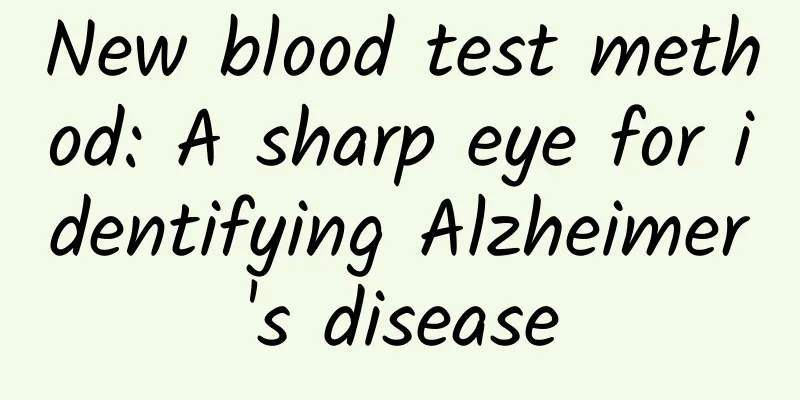New blood test method: A sharp eye for identifying Alzheimer's disease

|
Author: Duan Yuechu A new blood test could help doctors diagnose Alzheimer's disease more quickly and accurately, researchers revealed on Sunday (July 28), shedding new light on the diagnosis of the disease. It has always been difficult to tell whether memory problems are caused by Alzheimer's disease. Usually, this requires hard-to-obtain brain scans or uncomfortable spinal taps to confirm the accumulation of beta-amyloid, one of the hallmarks of the disease. However, many patients are diagnosed based only on symptoms and cognitive tests. Labs are beginning to offer tests that detect some markers of Alzheimer's in the blood. Scientists are excited about the potential of these tests, but they are not widely used because of a lack of data to guide doctors on which tests to choose and when to do them. The U.S. Food and Drug Administration has not formally approved any of these tests, and insurance coverage is even rarer. Dr. Suzanne Schindler, a neurologist at Washington University in St. Louis who works on the study, asked: “Which tests can we trust?” While some are fairly accurate, “others are no better than flipping a coin.” As society develops, the need for early diagnosis of Alzheimer's disease is growing. In the United States, more than 6 million people suffer from Alzheimer's disease, and the number of patients worldwide is even larger. This is the most common form of dementia. Its prominent "biomarkers" are amyloid plaques in the brain and abnormal tau protein tangles that cause neuronal death. The new drugs Leqembi and Kisunla can modestly slow symptoms by clearing amyloid from the brain. However, they work only in the early stages of Alzheimer’s, and it can be difficult to qualify patients for them in a timely manner. Measuring amyloid in spinal fluid is an invasive procedure, and special PET scans to detect plaques are expensive and can take months to schedule. Even experts sometimes have trouble determining whether a patient’s symptoms are caused by Alzheimer’s. “I often come across patients who I’m sure have Alzheimer’s, but I run a test and it comes back negative,” Dr. Schindler said. New research suggests that it may be easier and quicker to test for Alzheimer's disease through blood tests. Until now, blood tests have been used mainly in carefully controlled research settings. But a new Swedish study of about 1,200 patients suggests that these tests could also be useful in busy doctors' offices, especially primary care doctors who see more patients with memory problems but have fewer tools. Copyright images in the gallery. Reprinting and using them may lead to copyright disputes. In the study, patients who visited their primary care physicians or specialists for memory problems underwent traditional exams, provided blood samples for testing, and were sent for confirmatory spinal taps or brain scans. The blood test's accuracy improved dramatically, Lund University researchers reported Sunday at the Alzheimer's Association International Conference in Philadelphia. The blood test was 91% accurate compared with 61% for a primary care doctor's initial diagnosis and 73% for a specialist, the researchers reported in the Journal of the American Medical Association. So who should use Alzheimer's blood tests? Currently, only doctors can order these tests from a lab. The Alzheimer's Association is developing guidelines, and several companies plan to seek FDA approval, which would further clarify their proper use. Dr. Schindler stressed that these tests are not currently available for people who have no symptoms but are concerned about Alzheimer's disease in their family, except as part of a research study. This is partly because amyloid buildup can begin two decades before memory problems appear. So far, there are no effective preventive measures for these people, beyond basic advice on healthy eating, exercise and getting enough sleep. However, there are studies underway testing possible treatments for people at high risk, some of which include blood tests. This series of research and exploration has shown us a new direction for the diagnosis of Alzheimer's disease, and has also made us look forward to more accurate and convenient diagnostic methods in the future. We hope that in the near future, blood tests will bring revolutionary changes to the diagnosis of Alzheimer's disease, allowing more patients to receive accurate diagnosis and effective treatment earlier. |
>>: Drinking for fun? Beware of alcoholic liver disease
Recommend
Why do some people blink frequently while babies rarely blink?
Audit expert: Liu Dongbao Chief Physician of Opht...
Did ancient Chinese drink boiled water? The answer is surprising
In our daily lives, drinking boiled water has bec...
Tips for Weibo promotion and traffic generation
Weibo is a platform with huge traffic, with two s...
ASO Optimization: Detailed Explanation of App Store Ranking Rules
ASO optimization obviously affects the first step...
How to promote games? Excellent materials for you to interpret!
The current forms of promotional materials in the...
China Automobile Dealers Association: In-depth analysis of the used car market in October 2020
In October 2020, the national second-hand car mar...
A dirty chip will affect performance. Here are four ways to clean it.
Do you usually wash dishes, vegetables, fruits or...
It’s terrifying to think about it. Why are there so many coincidences in nature and mathematics?
The sun rises and sets, the grass grows and the b...
After swimming between toilet seats and plastic bottles for 80 days, he discovered countless beautiful lives
In June 2019, long-distance swimmer Ben Lecomte e...
Advertising case study: how to reduce the cost of leads by 50%?
Today I would like to share with you a case study...
The sparrow is too small to have meat! A large number of home appliance dealers have disappeared
In recent years, it is with this mentality that a...
Report: More than 60% of 4K TVs have not been quality tested
Since last year, 4K TV (ultra-high-definition TV) ...
How well do you know your ears? Long picture comics take you on an ear "adventure"
The cover image and the images in this article ar...
Who are the Chinese “old residents” on the far side of the moon?
Since the impact craters on the back side of the ...
Why are Want Want’s marketing ads so magical?
I recently watched two Want Want commercials. The...









